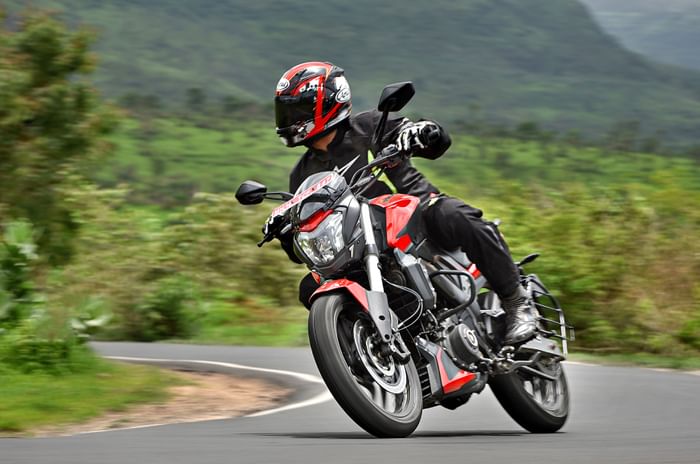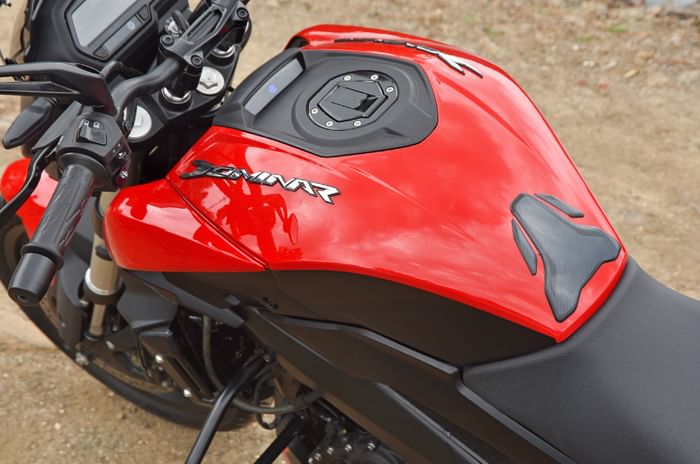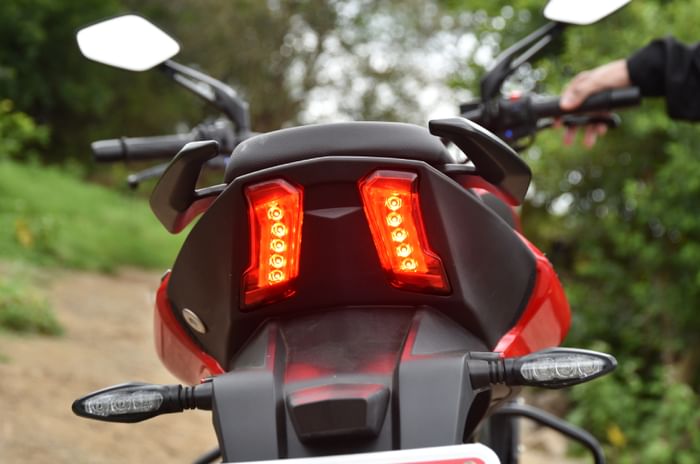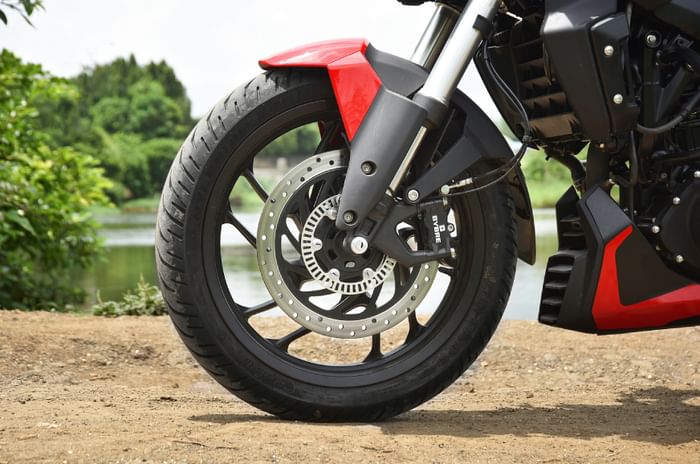Bajaj Dominar 250 review, test ride
The Dominar is now available with a smaller-capacity engine but does it dampen the overall experience?
Published on Jul 12, 2020 05:00:00 PM
59,830 Views
Follow us on


The typical Indian motorcycle buyer's decision hinges on a number of factors but key among those is the engine's cubic capacity. More often than not, it is the 'CCs' that help form a perception about a motorcycle's performance and fuel economy, even before turning the key. Bajaj certainly thinks so and is of the opinion that a lower -capacity Dominar could attract more people into the fold, especially those who thought that a near-400cc Dominar was a bit too much to handle. Enter the new Dominar 250. This 250cc motorcycle may be down on engine size but it promises to offer the same long-distance touring ability and comfort that the Dominar 400 is known for. The question is, can it actually deliver?

New wine, same bottle
The Dominar 400's design is among the most unique we've seen in India and I think that is where its USP lies. Bajaj has got the power cruiser stance right and the 2019 version, in particular, looks fetching with its blacked-out areas and glossy paintwork. The new Dominar 250 continues pretty much in the same vein. It has the same body panels, the bright LED headlamp, chunky 13-litre fuel tank and rear cowl. Even the wheel design is the same, except that it does not get the 400's lovely diamond-cut finish on the spokes that not only looks great when the motorcycle is stationary but also in motion. While I'm ok with the lack of the shiny element on the wheels, I'm not a fan of the skinny 130-section rear tyre that destroys the Dominar 250's sense of proportion. It's as if it skipped leg day at the gym! The reason behind fitting a narrower tyre instead of using the D400's fatter 150-section tyre was a case of functionality taking precedence over form, and I'll get to the reason behind it a little later.

This visual niggle aside, I'm pretty impressed with the D250's shape, overall build, as well as the fit and finish. The switchgear has a well-damped feel, the panel gaps are consistent and the new fiery red paint (exclusive to the Dominar 250) makes it appear quite striking. Bajaj has certainly come a long way in ensuring that their motorcycles, like the Dominar, look premium, but I wish they had not skimped on the features of the LCD instrument console. Unlike the D400's feature-rich unit, the Dominar 250's instrument cluster and a secondary display on the fuel tank are devoid of even basic information like a gear position indicator, average fuel consumption or a distance-to-empty readout. These are essential bits of information, especially on a motorcycle that is being marketed as one for covering long distances and exploring areas far beyond the concrete jungle. I assume cost was one of the constraints that must have forced Bajaj to use the console from the pre-2019 Dominar 400, the other being the need to distinguish it over the bigger Dominar. And while that is something that I can overlook, the bigger concern is whether the 250cc engine is up to the task of offering the performance expected from a touring machine.

Power bank
The Dominar 250's engine is based on the KTM 250s. However, the new cylinder head, with Bajaj's very own dual-spark technology, is what sets it apart from the KTM. It also has a lower compression ratio of 11.9:1 versus the KTM's 12.5:1, so naturally, it is calmer and makes less power and torque than the Austrian machine. But let that not lead you to believe that the Bajaj is a slouch, considering its 27hp/23.5Nm figures and 180kg kerb weight. In fact, the Dominar 250 is surprisingly quick off the line and Bajaj has been clever in using the same gearing and final drive ratio as on the KTM 250 Duke. Our test results clearly show that in the sprint from 0-60kph, the Dominar 250 took 3.82sec, which is only about half-a-second slower than the much lighter and more powerful KTM 250 Duke. Even in the sprint from 0-100kph, it took a little under 10sec, which again is 0.8sec slower than the Austrian machine.

While that should allay any doubts about acceleration off the blocks, another aspect about the engine that I find endearing is its low-speed tractability. You can choose to pootle around town at city speeds in higher gears, without a sign of protest from the engine, and all you need is a gentle roll on the throttle to get past slower moving traffic. And when it is time to shift gears, the impossibly light clutch and smooth gearbox make the entire process quite effortless. As a city motorcycle then, the Dominar 250 is more than capable of handling the task. However, the real essence of a Dominar is in its highway performance, and gladly, this engine does not disappoint on that count.
Despite the amount of weight that it has to haul along, the engine does not feel stressed, even at speeds of 100-120kph. In fact, the tall fifth and sixth gears ensure that the engine is chugging along at a relaxed 6,000-7,000rpm, while cruising at those speeds. However, the only issue with the tall gearing is that you'll have to downshift in order to execute a quick overtake at highway speeds. Good thing then that the double-barrel exhaust lets out a loud and throaty sound, especially under hard acceleration!
To sum up, the engine is smooth and has more than enough grunt for long rides, which addresses one of the major concerns we had before riding the small-capacity Dominar.

Smooth operator
Bajaj made major improvements to the Dominar 400's ride and handling in the 2019 version, and those learnings seem to have had a positive influence on the Dominar 250's setup as well. For starters, it shares the same feedback-rich, steel perimeter frame with the D400, and that's a great place to begin with. But the other bits that are specific to the D250 include the new 37mm USD fork (43mm on the D400) and the narrower tyres that are of the same size as on the Bajaj RS200, but constructed of a softer compound. Bajaj says the reason they didn't opt for the D400's wider rubber was because of the cost and, secondly, for the impact that it would have had on performance and fuel efficiency. Thankfully, the narrow tyres have not had a major impact on the way the D250 behaves. You can chuck this Dominar into corners with sufficient grip and feedback from the tyres, complemented by the communicative chassis. Make no mistake though. This isn’t a corner carver, so don't expect lightning-quick turn-in and sharp handling. The Dominar 250 is built to cover long distances at a quick pace, over good and bad roads, and with or without luggage strapped on. That said, it remains surefooted through corners and credit for this also goes to the good setup suspension.

When it comes to ride quality, the Dominar 250 simply glides over everything, like roads dented with the occasional potholes or monsoon-induced craters. At times, you cringe in anticipation of that annoying thud while riding over a bad patch, but the suspension absorbs everything with aplomb. The best bit though is that, despite the plush setup, the D250 does not pitch or wallow while encountering mid-corner bumps. It also remains stable at high speeds and around corners because of the long wheelbase (same length as on the D400) and the new swingarm that tells you exactly what the rear wheel is doing, at all times. This kind of neutral ride and handling is what many first-timers will appreciate and that will be one of the biggest strengths of the D250.
As far as braking is concerned, the 300mm disc and Bybre calipers offer sufficient performance to haul the motorcycle to a stop quite well, but the feel is wooden and you’ll need to give the lever a hard pull for maximum braking.

Worthy of the name?
There is no denying that there was a slight sense of doubt that hung in the air before we began testing the Dominar 250. The worry was whether or not the smaller-capacity engine had diluted the Dominar experience and we can finally conclude that this is not the case. Sure, it is not as quick or as well-equipped as the Dominar 400, but it isn't too far off either in both aspects. At Rs 1.60 lakh (ex-showroom), the Dominar 250 undercuts the fantastically priced D400 by Rs 35,000, which is a significant amount. This is especially true in the case for those upgrading from a 150cc motorcycle or looking to buy their first touring machine.
But that's not all, because at this price point the D250 is among the cheapest 250cc motorcycle that money can buy, with only the Yamaha FZ25 undercutting it on price.
For the money, the D250 offers enough real-world performance, bundled with a comfortable ride and confident handling. As a package, the Dominar 250 is excellent value and when you come to think of it, the Dominar has always been known to be just that.

Also see:
Tech Specs 
Copyright (c) Autocar India. All rights reserved.


 Wheels and Tyres
Wheels and Tyres Dimensions & Chassis
Dimensions & Chassis Price
Price Engine
Engine Transmission
Transmission Braking
Braking Efficiency
Efficiency Acceleration
Acceleration Suspension
Suspension Brakes
Brakes
Comments
Member Login
Personal Details
No comments yet. Be the first to comment.